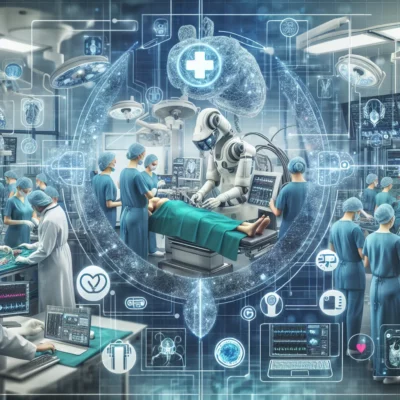In the rapidly evolving landscape of healthcare, automation stands as a beacon of innovation, promising to reshape how services are delivered, managed, and experienced. As healthcare systems worldwide grapple with increasing demands, automation emerges as a crucial ally in enhancing efficiency and improving patient care. This blog delves into the transformative power of automation in healthcare, exploring its current applications, benefits, and future potential.
Understanding Automation in Healthcare
Automation in healthcare refers to the use of technology to perform tasks that traditionally require human intervention. This includes a range of technologies such as robotic process automation (RPA), artificial intelligence (AI), and machine learning. These technologies are pivotal in addressing some of the most pressing challenges in healthcare, such as reducing operational costs, minimizing human error, and improving service delivery.
- Robotic Process Automation (RPA): RPA is used to automate repetitive and mundane tasks, such as data entry and appointment scheduling, freeing up healthcare professionals to focus on more critical tasks.
- Artificial Intelligence (AI) and Machine Learning: AI and machine learning are employed in predictive analytics, diagnostics, and personalized medicine, enabling more accurate and timely interventions.
The relevance of automation in healthcare cannot be overstated. As healthcare systems face mounting pressures from aging populations, chronic diseases, and resource constraints, automation provides a pathway to enhance efficiency and effectiveness.
Streamlining Administrative Processes
One of the most significant impacts of automation is in streamlining administrative processes. The healthcare sector is notorious for its paperwork and administrative burdens, which can detract from patient care.
- Automated Scheduling: Automation tools can handle complex scheduling tasks, ensuring optimal use of resources and reducing patient wait times.
- Billing and Patient Record Management: Automated systems can process billing and manage patient records with greater accuracy and speed, reducing errors and improving compliance.
The impact on healthcare staff is profound. By reducing the time spent on administrative tasks, healthcare professionals can dedicate more time to patient care, leading to improved job satisfaction and reduced burnout.
Enhancing Clinical Efficiency
Automation is also making significant strides in enhancing clinical efficiency. In diagnostics and treatment planning, automated systems can analyze vast amounts of data to aid in decision-making.
- AI in Diagnostics: AI algorithms can process medical images and data faster and often more accurately than humans, assisting in early detection of diseases.
- Predictive Analytics: By analyzing historical data, AI can predict patient outcomes and suggest preventive measures, leading to better health management.
Case studies abound where automation has improved clinical workflows. For instance, hospitals using AI for diagnostic imaging have reported faster turnaround times and increased diagnostic accuracy, ultimately improving patient outcomes.
Improving Patient Care and Experience
Automation is not just about efficiency; it’s also about enhancing the patient experience. Personalized care and improved communication are at the forefront of this transformation.
- Personalized Patient Care: Automation allows for tailored treatment plans based on individual patient data, improving the quality of care.
- Chatbots and Virtual Assistants: These tools facilitate communication, providing patients with instant access to information and support, thereby improving engagement and satisfaction.
Patient feedback often highlights the convenience and improved communication afforded by automated systems, underscoring the positive impact on patient experience.
Overcoming Challenges and Concerns
Despite its benefits, automation in healthcare is not without challenges. Data security and privacy are paramount concerns, given the sensitive nature of health information.
- Data Security and Privacy: Robust measures must be in place to protect patient data from breaches and misuse.
- Training Healthcare Professionals: As automation becomes more prevalent, healthcare workers need training to effectively collaborate with these systems.
Ensuring the ethical use of automation is also critical. This involves developing guidelines and standards to ensure that automation serves the best interests of patients and healthcare providers alike.
The Future of Healthcare Automation
Looking ahead, the future of healthcare automation is bright, with numerous trends and innovations on the horizon. From advanced AI-driven diagnostics to fully automated hospitals, the possibilities are endless.
- Future Trends: We can expect to see more integration of AI in clinical decision-making, as well as the use of blockchain for secure data management.
- Long-term Benefits: Automation promises to reduce costs, improve patient outcomes, and enhance the overall efficiency of healthcare systems globally.
Adopting a forward-thinking approach to automation is essential for healthcare providers aiming to stay ahead of the curve. By embracing these technologies, healthcare systems can not only meet current demands but also prepare for future challenges.
As automation continues to revolutionize healthcare, it is clear that its role in enhancing efficiency and improving patient care is indispensable. The journey towards a more automated healthcare system is not without its hurdles, but the potential benefits make it a journey worth undertaking.
